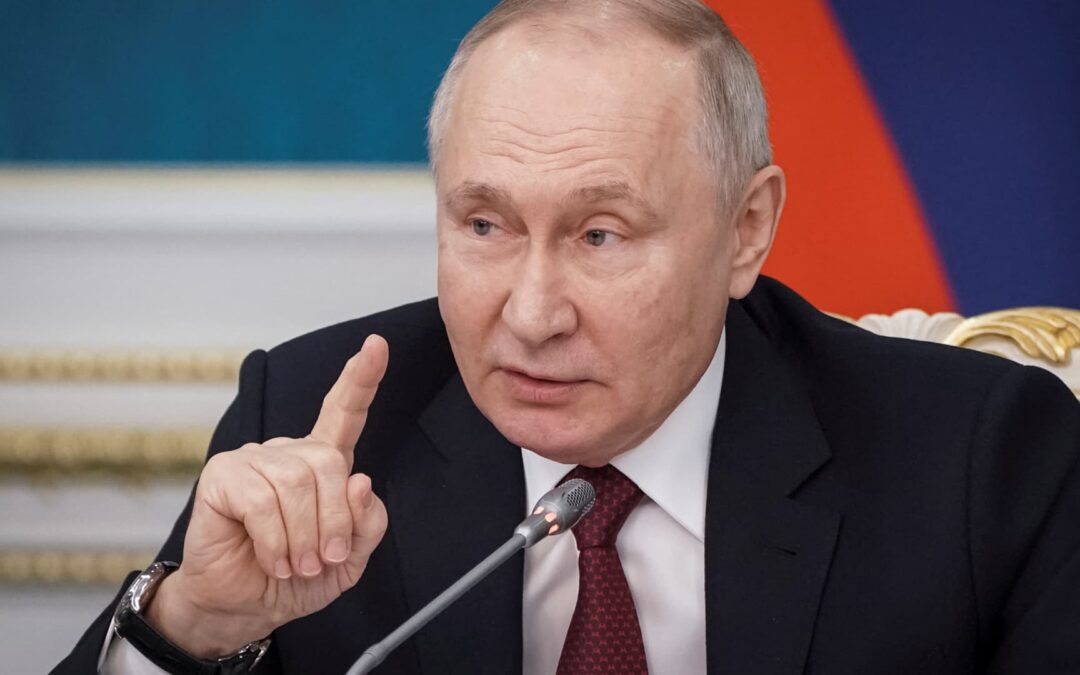Putin peace talk comments designed to pressure West, analysts say
Russian President Vladimir Putin.
Mikhail Svetlov | Getty Images News | Getty Images
Analysts say Russian President Vladimir Putin’s comments Wednesday regarding peace talks with Ukraine were likely aimed at piling pressure on the West to push Ukraine toward the negotiating table with Russia.
Addressing the G20’s virtual summit on Wednesday, Putin blamed Ukraine for the lack of peace talks to end the war, claiming Russia was ready to return to the negotiating table. Analysts said the conciliatory tone of the comments was designed to pressure the West into pushing Kyiv to negotiate with Russia.
“Putin … reiterated boilerplate rhetoric falsely portraying Russia as willing to engage in meaningful negotiations, likely to pressure the West into prematurely pushing Ukraine to negotiate with Russia,” analysts at the Institute for the Study of War think tank said Wednesday.
The ISW noted, however, that Putin and other Russian officials have routinely falsely claimed that the Kremlin is ready to negotiate to end the war while signaling that the Kremlin maintains its maximalist objectives, including territorial claims and regime change.
“Kremlin officials have pushed this narrative while claiming that Ukraine is unwilling to negotiate with Russia, likely to coerce Western officials into prematurely offering concessions favorable to Russia rather than engage in meaningful, good faith negotiations.”
The ISW said it “has observed no indications that Putin does not retain his maximalist objectives and continues to assess that a premature cessation of hostilities in Ukraine greatly increases the likelihood of renewed Russian aggression on terms far more favorable to the Kremlin in the near future.”
Ukraine has said it’s willing to negotiate with Russia as soon as Russia removes its forces from Ukraine’s internationally recognized territory, including regions it claims to have annexed.
— Holly Ellyatt
Ukraine welcomes Western allies’ air defense coalition
President Volodymyr Zelenskyy and his defense minister welcomed the formation by Ukraine’s Western allies on Thursday of a 20-nation “coalition” to boost air defenses, seen as a key element in the country’s campaign against Russian forces.
Zelenskyy said the group, one of several devoted to specific areas of Ukraine’s defence, was formed at a virtual meeting of the “Ramstein group” examining Ukraine’s military needs.
Germany’s Defense Ministry had earlier announced the formation of the group in a posting on X, formerly Twitter, with Germany and France taking on leading roles.
“Thanks to every country participating in these efforts for enabling our cities and villages to be better protected against Russian attacks,” Zelenskyy said in his nightly video address.
“Not everything can be disclosed publicly at this time, but the Ukrainian air shield is becoming stronger every month.”
Ukraine’s President Volodymyr Zelenskyy speaks via video link with U.S. Secretary of Defense Lloyd Austin (on screen) during a meeting of ministers of defense at Ramstein Air Base in Germany to discuss how to help Ukraine defend itself, amid Russia’s attack on Ukraine continues, in Kyiv, Ukraine January 20, 2023.
Ukrainian Presidential Press Service | Reuters
Defense Minister Rustem Umerov also noted other assistance agreed by participants, including a German air defense package announced this week during a visit to Kyiv by Defense Minister Boris Pistorius. Also noted were a Dutch package and Estonian financing for help with information technology.
Ukraine’s military commander-in-chief, General Valery Zaluzhnyy, said on Telegram that he had taken part in the meeting for the first time, describing the situation along the 1,000-km (600-mile) front as “complicated but controllable.”
— Reuters
Finland to close all but one border crossing point with Russia
Chief of the Finnish Border Guard, Lieutenant General Pasi Kostamovaara (L) looks on as Finnish Prime Minister Petteri Orpo speaks at a press briefing during his visit to the Vartius border crossing station in Kuhmo, eastern Finland, on November 20, 2023.
Hannu Huttu | AFP | Getty Images
Finland is to close all but the most northern border crossing point with Russia in an effort to halt asylum seekers traveling to the country, which it claims Russia is encouraging.
Border crossing points of Kuusamo, Salla and Vartius at the eastern border with Russia will close at midnight on Friday, leaving only the border crossing point of Raja-Jooseppi open. Being the northernmost crossing on its border with Russia, it’s seen as harder to reach. The decision will remain in force until Dec. 23.
Finland said it had made the decision in light of “instrumentalised migration from Russia.” It said “the escalation of the situation [poses] a serious threat to national security and public order.”
Since the beginning of August, about 700 third-country nationals have arrived in Finland without a visa via the border crossing points at the eastern border. They have then applied for asylum in Finland, the government said in a statement.
“According to the observations made and information received by the Border Guard and other authorities, it is clear that foreign authorities and other actors have played a role in facilitating the entry of persons crossing the border into Finland,” the statement said.
“The Russian authorities are allowing this to happen, which is a change from their earlier procedures. The situation also involves international crime,” it added.
Earlier this week, Kremlin spokesperson Dmitry Peskov denied Finland’s accusation that Russia was deliberately pushing illegal migrants toward the border. Estonia has also accused Russia of bringing migrants to its border in a bid to undermine national security, calling it a “a “hybrid attack operation” this week. The Kremlin has not responded to the allegation.
— Holly Ellyatt
Photos show Kyiv covered in Snow as war rages on
Photos published via Getty Images on Wednesday show Ukraine’s capital Kyiv covered in snow as daily life continues amid Russia’s full-scale invasion.
Pedestrians walks past destroyed Russian military vehicles blanketed in snow in front of Saint Michael’s Golden-Domed Monastery, in downtown Kyiv, on November 22, 2023.
Roman Pilipey | Afp | Getty Images
A woman sits in a street blanketed in snow, in front of the memorial wall of fallen defenders of Ukraine in the Russian-Ukrainian war, in downtown Kyiv, on November 22, 2023.
Roman Pilipey | Afp | Getty Images
A couple walks in a snow covered park in Kyiv on November 22, 2023.
Sergei Supinsky | Afp | Getty Images
An aerial view shows Ukraine’s Motherland monument, with its new Ukrainian coat of arms shield, after fresh snowfall on November 22, 2023 in Kyiv, Ukraine.
Kostya Liberov | Libkos | Getty Images News | Getty Images
Putin says war in Ukraine is a ‘tragedy’
Russian President Vladimir Putin said the Group of 20 (G20) nations has to think about ways to stop the war in Ukraine, describing it as a “tragedy.”
Addressing the virtual G20 summit hosted by India on Wednesday, Putin said that Russia had never refused to participate in peace talks with Ukraine, according to comments reported by news agency TASS.
Instead, Putin once again blamed Ukraine for previous peace talks failing, and then claimed there is a law in Ukraine prohibiting discussions.
“Of course, we must think about how to stop this tragedy. By the way, Russia has never refused peace negotiations with Ukraine; it was not Russia, but Ukraine that publicly announced that it was withdrawing from the negotiation process. And moreover, it was a decree, a decree of the head of state, was signed prohibiting such negotiations with Russia,” Putin said, TASS reported.
Putin used the word “war” to describe the conflict in Ukraine, diverging from Moscow’s usual mantra of calling the invasion a “special military operation.” He said: “I understand that this war can’t help but be shocking. But the bloody coup in Ukraine in 2014, which was followed by the Kyiv regime’s war against its own people in Donbas – is that not shocking?”
Russia claims a 2014 uprising against the then pro-Russian leadership in Ukraine was a “coup” orchestrated by foreign countries. The uprising acted as a catalyst for Ukraine’s deeper split from Russia, after which Moscow supported pro-Russian separatists in eastern Ukraine, a region known as Donbas.
Russian President Vladimir Putin speaks after signing bilateral documents with his Kazakh counterpart Kassym-Jomart Tokayev in Astana, Kazakhstan November 9, 2023.
Turar Kazangapov | Reuters
Russia invaded Ukraine in February 2022 but has invariably blamed Ukraine and NATO for the war, claiming the West wanted to inflict a “strategic defeat” on Russia, without presenting evidence. NATO countries, which have provided Ukraine with military, financial and humanitarian aid, say they are helping Ukraine to defend its sovereignty and territorial integrity.
Russia remains a member of the G20 although it was kicked out of the smaller, more exclusive G8 back in 2014 after it invaded and annexed Crimea.
Kyiv has previously attended peace talks with Russia but these failed and since then both sides have hardened their stances and cemented “red lines” preventing any peace deal. Ukraine has said negotiations won’t restart while Russian troops are on its territory.
— Holly Ellyatt
‘Confused’ infantry combat on east bank of the Dnieper river
The U.K.’s Ministry of Defence described fighting between Russian and Ukrainian forces on the east (or left) bank of the Dnieper river as “confused” and taking place in a “complex” terrain.
In an intelligence update on X, formerly known as Twitter, the ministry said that fighting has continued around the village of Krynky where Ukrainian marines maintain a bridgehead on the east bank of the Dnieper river. Ukraine and Russia confirmed last week that units had crossed the river and established several footholds on the east bank, the side of the river occupied by Russian forces.
Ukrainian soldiers navigate on the Dnipro river by boat at the frontline near Kherson, Ukraine, Sunday, June 11, 2023.
Mstyslav Chernov | AP
Since then, fighting has been concentrated around several villages, including Krynky.
“The ground fighting has been characterised by confused, dismounted infantry combat and artillery exchanges in complex, wooded terrain,” the U.K.’s defense ministry said Wednesday.
“Ukraine has made particularly effective use of small attack uncrewed aerial vehicles, while the Russian Air Force is conducting significant numbers of sorties in support of frontline troops, predominantly launching munitions from beyond the range of Ukraine’s air defences.”
The ministry noted that, while the fighting around Krynky is on a smaller scale than some major battles of the war, it “will be considered highly unfortunate by Russian leaders.”
“Russia withdrew from the west bank of the Dnipro River a year ago, almost certainly aiming to hold Ukrainian forces west of the river, keep the sector quiet, and free up Russian forces elsewhere.”
— Holly Ellyatt
Kremlin declines to comment on suggestion that Russia may get ballistic missiles from Iran
Iranian President Ebrahim Raisi greets Russian President Vladimir Putin on July 19, 2022. Putin likely wanted to show that Moscow is still important in the Middle East by visiting Iran, said John Drennan of the U.S. Institute of Peace.
Sergei Savostyanov | AFP | Getty Images
The Kremlin declined on Wednesday to comment on a suggestion by White House spokesman John Kirby that Iran may be considering providing Russia with ballistic missiles for use in Ukraine.
“We are developing relations with Iran, including in the field of military-technical cooperation, but we do not comment on this information,” Kremlin spokesman Dmitry Peskov told reporters in a regular news briefing.
Kirby said the United States would monitor the situation between Iran and Russia, and take appropriate action as needed.
— Reuters









